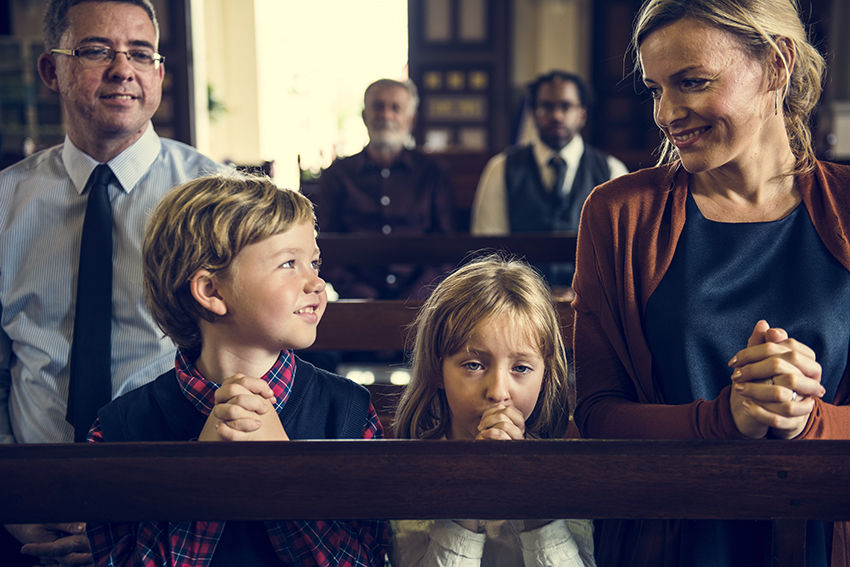I grew up in a big Catholic family. Big by today’s standards, anyway. I remember wishing my parents had had a few more kids so we could match those families that muster on their own two teams for a full court basketball game.
When I meet someone who grew up in a large family, I invariably ask them how many of their siblings are still Catholic. The answers vary, and lead to stories about other paths taken. Sometimes divorce and remarriage. Sometimes a spouse who goes to a different church. Sometimes too busy or too uninterested to “give up their Sunday.”
My parents were highly committed Catholics who supported parochial schools and beyond, but they ended up batting about 50 percent. (I like to say that they were 100 percent successful in raising kids who were spiritually serious, even if they all didn’t stay on board the Bark of Peter.)
Now that I’m a dad, my question about handing on the practice of the faith has taken on a new urgency.
In my less spiritually intelligent moments, I can succumb to the vanity that the percentage of my kids who take their faith seriously is a reflection on me — the grade I’ll be held accountable for.
Life is a lot messier than that, I realize, and it is pride that makes us think that we are the puppet masters who determine if our kids stay Catholic. Faith is God’s gift, not our possession for us to dole out.
Yes, we as parents play a critical role, by our example as much as by our words. There aren’t guarantees when it comes to handing on the faith, however. Some of the saddest parents I know are those who began their families when they were engaged in various movements, such as the Charismatic Renewal, only to have their children reject any sort of religious identity.
This doesn’t only happen to Catholics, by the way. I know one person who joined what many might call a “cult.” He was passionate about his faith, yet he has raised two children who will have nothing to do with it. One generation’s enthusiasm too often becomes the bane of the next.
But the question of how we hand on the faith is a profoundly existential one for all of us who care about our Church and take seriously our relationship with the Lord. We were not put on this earth to become the last generation of Catholics. Our discipleship is necessarily intended to be generative in its witness, and it is not vanity but a Gospel mandate to want to invite people to fall in love with the God we love.
Today our Church faces a collection of crises regarding the handing on of the faith. Various sacramental practices like marriage and baptism are in statistical decline. The percentage of people attending Mass has been dropping for years. We are not facing extinction yet, but everyone from the Catholic textbook publisher to the parish director of religious education can tell you that the numbers do not look good.
What does the future hold? I recently received a scary glimpse of one future scenario. It came in the form of a conversation with a German Catholic journalist. Germany, once the land of the Holy Roman Emperor and birthplace of Lutheranism, is now a shell of the Christian powerhouse it once was.
My professional colleague lives in Berlin, which he described as 65 percent nonbaptized nonbelievers. Catholic Mass attendance nationwide is less than 10 percent (though higher in the staunchly Catholic state of Bavaria.) Protestant church attendance is below 4 percent. More people are employed by the Lutheran Church than attend its services each Sunday.
In the diocese where my colleague grew up, the bishop recently reduced the number of parishes from 900 to 30. In the entire country of 80 million Germans, there are currently 80 seminarians.
The Catholic Church in our country is nowhere near this state of decline. Yet the German Church is a memento mori that such radical decline is possible.
The questions we should be asking now are not just directed to bishops and priests, but to all of us: How do we effectively instruct both the children and their undereducated parents in the faith? How do we foster a real relationship with the Lord? How do we prepare ourselves and our children to exist in a highly secularized, multicultural world in which at times we feel at home and at times we feel like strangers in a strange land?
We need to answer these questions. At the Easter Vigil this year, however, I had a more modest wish. I prayed that my children would remain close to God, that God would give them the gift of faith, and that, with his mercy, I wouldn’t screw the whole thing up. It was a parent’s prayer.

